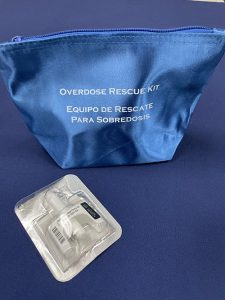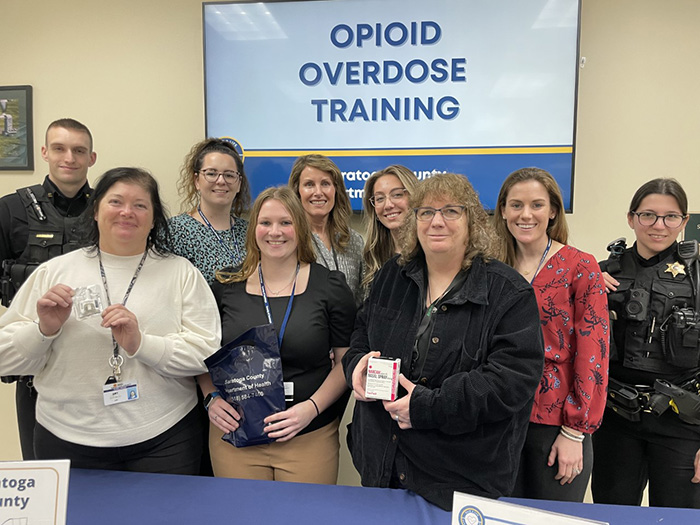By Cathy DeDe, Chronicle Managing Editor

Saratoga County received $899,467.17 to date in five opioid settlement agreements with drug companies, and it is using some of that money to get Narcan in the hands of community members.
Naloxone, the so-called “Lazarus” drug in Narcan, temporarily halts the immediate effects of an overdose.
The County has held several free Narcan distribution events already this year.
“It’s a good story,” says Todd Kusnierz, Moreau Town Supervisor and chair of the County Board of Supervisors, who also chairs the county Board of Health.
“Fighting the scourge of opioids is a top priority, and taking the steps to make sure residents have the tools and resources they need for those who are struggling with addiction. We are making key investments to help mitigate the growing presence of opioids in the county.”
Mr. Kusnierz predicts that other suits against drug companies will bring in “as much as a million dollars,” finally.
Stats: ODs on the rise
“We know that nationally, statewide, locally, there is an increase in opioid overdoses and fatalities, Mr. Kusnierz said.
He says that Saratoga County in 2022 saw 671 overdoses, 48 of them lethal. “And that’s just the ones that are reported.”
“The numbers in 2021 were 584 ODs, with about the same number of fatalities as 2022,” he says.
“This year, just since January, we’ve had 163 overdoses in only three months, and 12 have been fatal.”
More: “26 percent of the ODs are in the 40-49 year old age group. 40 percent are due strictly to opioids.”
Mr. Kusnierz is quoting the Public Health Dashboard on the County Website, which can further break down data by zip code and other stats.
In Moreau alone, he notes, “year-to-date it’s 26 ODs, with 4 of them fatal.”
“It’s all around us — why it’s crucial local governments act and work with partners and get into people’s heads….
“We’re using the funds not only for those struggling with addiction, but also their families, to help navigate the healthcare system to support their loved ones.”
It’s “a multi-agency approach,” Mr. Kusnierz says, involving the County Department of Health, Sheriff’s office, Mental Health and Addiction Services “all working together.”
“Boots on the ground,” Mr., Kusnierz says, “we’ve already held seven Narcan training and distribution events since February,” providing just under 2,700 Narcan kits to more than 360 residents.
The 10-minute training, which this reporter received at an event last week in Corinth, is simple: A public health nurse explains how to open the packet and administer the nasal spray with its built-in plunger, describes how to care for the person and what to do next.
Narcan: Lifesaver, not miracle
Contrary to what might be a common misconception, I learned, Narcan isn’t a miracle drug that makes the overdose go away. It buys time by blocking opioid receptors, reversing the immediate impact of the drugs, and most importantly getting a person breathing again.
However, when the Narcan wears off — after 30 to 90 minutes, typically — if the drugs are still in their system it is possible the person could go back into overdose. “Some people feel better and take more drugs and overdose again,” I was also told in the meeting.
So note: Narcan saves lives because it allows time for emergency personnel to arrive, or for the person to get to a hospital. Medical attention is still highly recommended in all cases.

The Narcan kit includes a handout on the state’s “Good Samaritan Law” that allows people to call 911 without fear of arrest in the case of a drug or alcohol overdose. “The law empowers YOU to save a person’s life,” it says.
Now, Sheriffs check back in
Another key aspect, Mr. Kusnierz notes, is the “Second Chance” the Sheriff’s office and other agencies launched in 2017.
“There is a practical and moral need for an new approach to the relationship between people suffering from addiction and policing agencies,” he said. “Addiction doesn’t just impact the individual, it impacts the entire family unit.”
After a drug related overdose, officers will return to do follow-up and outreach, check in on the person and their family, offer contacts to available recovery services.
“In 2022, Sheriff (Michael) Zurlo’s office completed 200 follow-ups,” Mr. Kusnierz lists. “The year before, 151. This year, they’re at 44 already.”
“It’s not an issue that goes away after an OD. They may want to make a change but be looking for direction. Normally, law enforcement would move on to the next situation. Now, we are circling back around, checking in.”
It works too, as crime prevention, he adds. “There’s a high probability that law enforcement will see these people again. There’s the uncontrollable urge to get product, there’s an economics to it. The next step usually involves running afoul of the law.”
Also: New ‘Mass Spectrometer’
The county has earmarked $50,000 of those settlement funds to purchase a mass spectrometer. Mr. Kusnierz believes they are the first county health department in the state to have such a tool.
It quickly identifies unknown substances in the blood, he said, allowing doctors and other health care professionals to treat overdose patients properly.
Without the tool on-site, the sample would be sent out of the county for testing, which could take up to several days.
“With this device,” Mr. Kusnierz said, “we can identify the substances within minutes, which is especially vital when you see street drugs laced with other drugs.”
Last week the Federal Drug Administration approved over-the-counter sales of Narcan on a trial basis, Mr. Kusnierz notes. “It’s still early,” he says, “we don’t know the details yet of how that will work.”
Washington County seeks more Narcan hand-out sites
In Washington County, Sheriff’s Lieutenant Kristen Hardy is overseeing efforts also to distribute free Narcan kits and training.
“About a year ago, we became our own distribution site for first responders and others to administer Naloxone,” Lt. Hardy said, under the brand name Narcan nasal sprays and kits.
This includes leave-behind kits when responding to an overdose, holding community outreach events to distribute the kits, and simply having residents drop in to the Sheriff’s office, often with concern for a loved one they fear is at risk of overdose, she said.
The county receives the kits free from the State Department of Health (as does Saratoga County).
“We have been recruiting partners, such as local fire departments, for distribution events,” most recently earlier this week in the Town of Easton.
She said the county saw 12 overdose fatalities last year. This year, since January 1, they’ve had five overdoses, with three of them fatal. View the stats on the Public Health Dashboard on the county website.
“We’re a small community with small numbers but it’s certainly widespread,” Lt. Hardy says. “It’s not uncommon for officers to respond to OD calls throughout their shifts.”
Lt. Hardy said “We are following the model of Saratoga County.” After an overdose, “We will do follow up care to try to see where they’re at. We’ve partnered in the county with agencies who provide resources.”
She said, “Only a year into the program, it’s hard to gauge” how effective it is. “It’s a national movement. We will see what the statistics will say. It is a different approach for officers,” she said, from earlier times, considering an overdose situation as a criminal event only.
“If any Washington County organization is interested in partnering with us to hold a training, they can certainly contact me directly and we can set up an event.” Office number: 518-746-2494.
Copyright © 2023 Lone Oak Publishing Co., Inc. All Rights Reserved
 Glens Falls Chronicle Serving the Glens Falls/Lake George region; Warren, Washington and northern Saratoga counties since 1980
Glens Falls Chronicle Serving the Glens Falls/Lake George region; Warren, Washington and northern Saratoga counties since 1980


